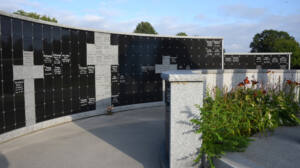
WelCom August 2024
Late last year, in response to a new set of dubia, or doubts, on the Catholic Church’s cremation practices, the Vatican’s doctrinal office – the Dicastery for the Doctrine of the Faith – reaffirmed a ban on spreading ashes in nature, but said they can be conserved in ‘sacred places’.
Earlier this year, the New Zealand Catholic Bishops Conference circulated policies and procedures which allow for the establishment of Columbaria in New Zealand Catholic parishes. A Columbarium is a place for the reverent conservation of the ashes of the faithful departed.
The policies are a recognition that while in the past the Church saw cremation as something to be avoided, cremation is becoming a choice for many Catholics.
‘The Columbarium provides a resting place that is recognisably Catholic for the ashes (cremains) of the faithful, consistent with Christian teaching on the dignity of the human body,’ says the Bishops’ statement. ‘It provides an opportunity for families to remember their loved ones and pray for them and will in general inspire a sacred reverence for this life and hope for eternal life.’
The policies state that eligibility for inurnment will normally be restricted to current or prior members of the parish, their spouses/partners and their children/stepchildren.
Columbaria constructed on parish or diocesan land must be permanent structures and any columbaria built on church land is to be canonically owned by the parish or the diocese. The parish, and ultimately the diocesan bishop, hold the ashes ‘in trust’ so that the Columbaria and contents are cared for with the same deliberation as the parish church. Deposited cremains are to be cared for in perpetuity.
Permission to construct a Columbarium must be obtained from the diocesan bishop.
‘The decision to construct a Columbarium,’ says the New Zealand Bishops’ statement, ‘will be guided solely by a desire for the parish to provide a burial place for the cremains of parishioners, recognising the deceased’s faith commitment to the Catholic Church’.